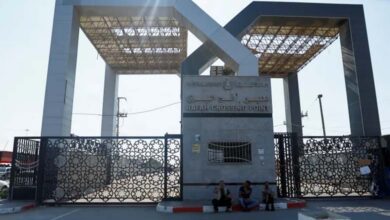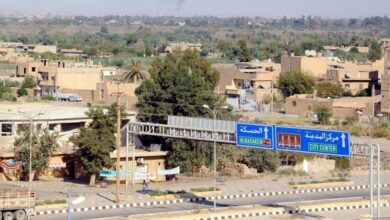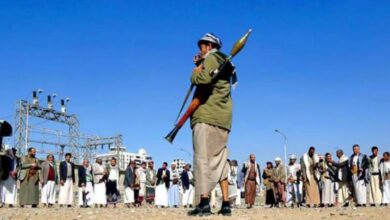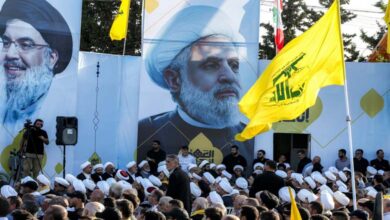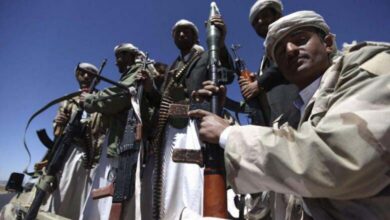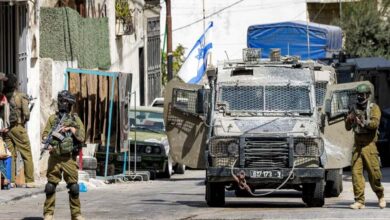Netanyahu rejects any Palestinian sovereignty over Gaza after the war
The Israeli army states that its forces, supported by air and sea cover, are destroying the "infrastructure" of Palestinian factions throughout Gaza

Israeli Prime Minister Benjamin Netanyahu reiterated on Saturday his refusal to grant Palestinians sovereignty over Gaza to ensure that it does not “pose a threat to Israel” after the ongoing conflict in the Palestinian territory entered its sixth day.
Netanyahu‘s office issued a statement, described by the Times of Israel as “rare,” stating that “in his conversation with President (Joe) Biden, Prime Minister Netanyahu once again affirmed his policy that after destroying Hamas, Israel must retain security control over Gaza to ensure that Gaza does not pose a threat to Israel anymore, a condition that contradicts the demand for Palestinian sovereignty.”
The statement from Netanyahu‘s office emphasized that Israel must maintain full security control over Gaza, after President Biden suggested that the Israeli leader might accept some “pattern” for a two-state solution, denying a report that Netanyahu informed Biden that he does not rule out the establishment of a Palestinian state.
The statement came after CNN, citing a source familiar with the conversation, reported that Netanyahu told Biden that his public statements the day before, where it appeared that the prime minister rejected the idea of establishing a Palestinian state, do not mean he completely rules out this outcome.
The statement added that in his conversation with President Biden, Prime Minister Netanyahu reiterated his long-standing position, expressed in a press conference the previous day, that “after eliminating Hamas, Israel must maintain full security control over Gaza to ensure that Gaza does not pose a threat to Israel,” contradicting the calls for Palestinian sovereignty.
There are growing disagreements between Jerusalem and Washington over the war in Gaza, initiated by Israel in response to an attack led by Hamas on October 7, resulting in the killing of around 1,200 people, the holding of approximately 240 hostages, and widespread destruction.
President Biden, after the Friday call, reiterated his commitment to a two-state solution, noting that “there are several kinds of two-state solutions. Several UN member states do not have armies.”
Netanyahu rejects Biden‘s vision for post-war Gaza, which involves political unification with the West Bank under the Palestinian Authority as part of a broader diplomatic initiative aimed at achieving a two-state solution ultimately and expanding the “Abraham Accords.”
While Netanyahu ruled out the idea of establishing a Palestinian state, he provided little detail about his alternative vision for Gaza, while the Cabinet prohibited discussions on this issue due to the fear that it would threaten the collapse of his coalition.
During the Thursday press conference, Netanyahu stated, “Those who talk about the ‘day after Netanyahu‘ are essentially talking about the establishment of a Palestinian state with the Palestinian Authority.” He added that most Israeli citizens oppose the establishment of a Palestinian state, and he would always resist the idea.
He continued by saying, “In all the territories we evacuate, we get terrorism, terrible terrorism against us,” citing Gaza, southern Lebanon, and parts of the West Bank. Therefore, he said, “In any future arrangement, or in the absence of an arrangement,” Israel must maintain “security control” over all lands west of the Jordan River – meaning Israel, the West Bank, and Gaza. “This is a fundamental condition.”
He acknowledged that this “contradicts the idea of sovereignty (for the Palestinians). What can be done? I am telling our American friends this truth.” However, Netanyahu affirmed that his position would not prevent Israel from expanding peace to new Arab countries, “alongside our American friends.”
It was also reported that Netanyahu rejected a U.S. proposal, presented by Secretary of State Antony Blinken earlier this month, which involved Saudi Arabia assisting in the reconstruction of Gaza alongside other Arab countries, in addition to agreeing to normalize relations with Israel, provided the latter agrees to provide Palestinians with a path toward establishing a Palestinian state.
On the other hand, a member of the political bureau of Hamas, Izzat al-Risheq, considered on Saturday that Biden is trying to “sell an illusion that… does not fool our people.”
UN Secretary-General Antonio Guterres reaffirmed on Saturday during the Non-Aligned Movement summit in Uganda that “rejecting the acceptance of the two-state solution for Israelis and Palestinians, as well as denying the Palestinian people’s right to establish a state, is unacceptable.”
In Paris, French Foreign Minister Jean-Yves Le Drian announced on Saturday that “the Palestinians have the right to sovereignty and to establish a state,” affirming through the platform X that “France will remain faithful to its commitment to achieve this goal.”
-
The rejection of the two-state solution by the Israeli ambassador disappoints the British government
Saturday evening, thousands of Israelis demonstrated in central Tel Aviv, calling for the release of the hostages held in Gaza and demanding early elections to overthrow Netanyahu.
The Israeli army intensified its military operations in Gaza on Saturday, where approximately 25,000 people have been killed since the beginning of the war, according to the latest tally from the Hamas-affiliated Ministry of Health, as tensions escalated in Syria with the killing of five advisers to the Iranian Revolutionary Guard in a strike attributed to Israel.
In Gaza, there were reports of intensive artillery shelling and Israeli airstrikes, especially in the city of Khan Yunis (south), which has become the new battleground for ground fighting and airstrikes after the first phase of the war focused on the northern part of the territory.
The Israeli army stated that its forces, supported by air and sea cover, are destroying the “infrastructure” of Palestinian factions throughout the territory, targeting rocket launch platforms in Khan Yunis.
This development comes as Hamas reported intense battles in the northern besieged sector, and according to the movement, 165 people were killed in the last 24 hours, while 62,388 people have been injured since the beginning of the war.
The war, which destroyed Gaza and displaced more than 80% of its population, erupted after Hamas launched an unprecedented attack on southern Israel on October 7, resulting in the death of 1,140 people, mostly civilians, according to official figures.
About 250 hostages were held during the attack and were transferred to Gaza, with approximately 100 of them released during a ceasefire at the end of November. According to Israel, 132 of them are still in Gaza, and it is believed that 27 of them died.
On Saturday, the Israeli army dropped leaflets on the city of Rafah, where tens of thousands of displaced people are gathered, showing images of hostages and calling on residents to provide any information about them. In Rafah, “five people, including a woman, were killed in a strike targeting a civilian car,” according to Hamas.
The World Health Organization expressed regret for the “inhuman living conditions” in the small coastal sector, with its 2.4 million inhabitants lacking everything, including communications.
The UN Office for the Coordination of Humanitarian Affairs (OCHA) stated that 375,000 people are at risk of “acute malnutrition” in Gaza. At least 1.7 million people have been displaced due to the war in Gaza, according to new figures from the United Nations Relief and Works Agency for Palestinian Refugees (UNRWA).
UNICEF announced on Friday that about 20,000 children were born “in the hell” of war since October 7, under “unimaginable conditions,” while the UN Women expressed concern about the number of “women and children” killed, warning of a shock “lasting for generations.”



